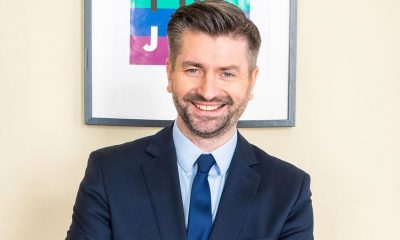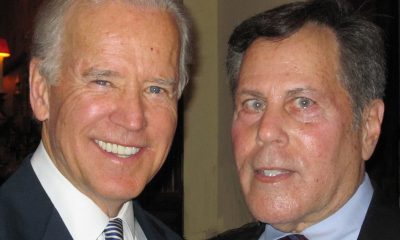Europe
Berlin becomes refuge for LGBTQ Ukrainians
Dmitry Shapoval swam across river to flee Ukraine
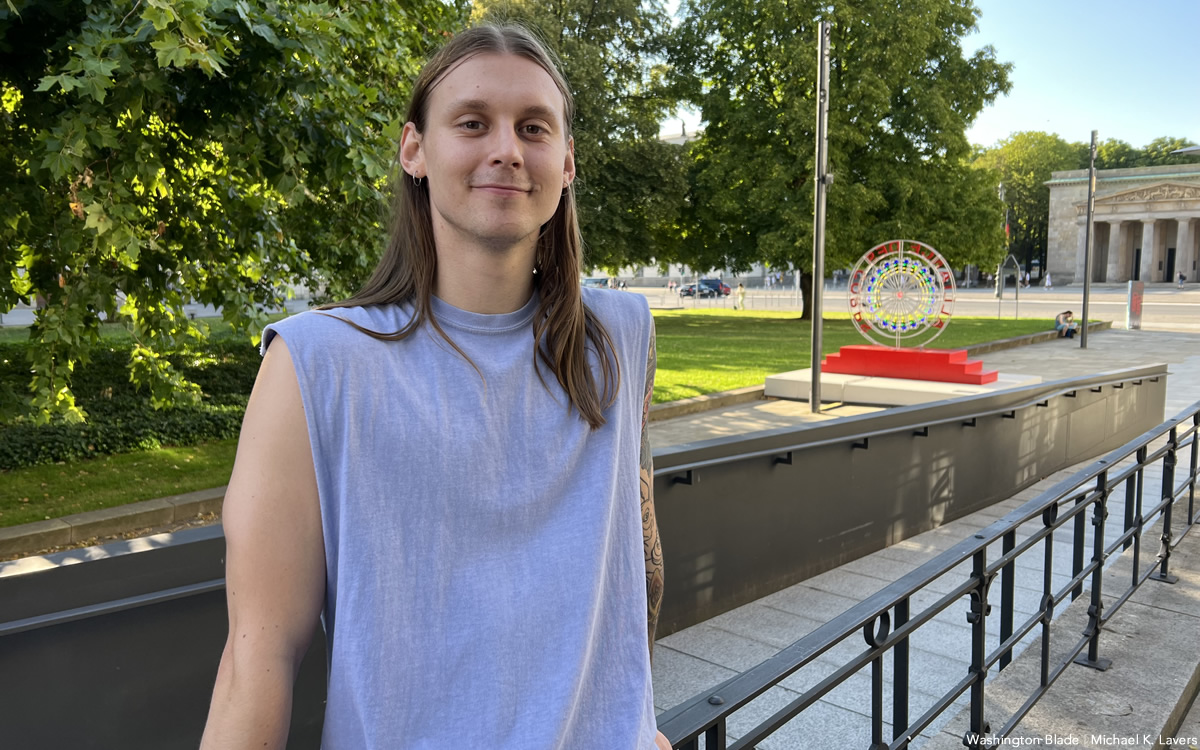
BERLIN — Dmitry Shapoval is a 24-year-old gay man from Ukraine who lives with HIV.
He was working at an IT company’s call center and studying web and UX design in Kyiv, the Ukrainian capital, in February when Russia launched its war against his country. Shapoval swam across a river and entered Poland less than a month later.
Shapoval now lives in Berlin with his cat Peach and has begun the process of resettling in Germany.
“I feel very secure here,” Shapoval told the Washington Blade on July 22 during an interview at Berlin’s Palais Populaire by Deutsche Bank on the city’s Unter den Linden boulevard.
Shapoval is one of the more than 900,000 Ukrainians who have arrived in Germany since the war began.
Ukrainians are able to enter Germany without a visa, and the German government provides those who have registered for residency a “basic income” that helps them pay for housing and other basic needs that include food. Ukrainian refugees can also receive access to German language classes, job training programs and childcare.
Anastasiia Baraniuk and her partner, Yulia Mulyukina, were living together Dnipro, a city on the Dnieper River in central Ukraine, when the war began.
Mulyukina, who is from Russia, was living in Moscow when she and Baraniuk began to talk online. Mulyukina traveled to Lviv in western Ukraine via Istanbul to meet Baraniuk, who is a Ukrainian citizen.
Mulyukina on July 22 told the Blade at Palais Populaire that she asked the Russian Embassy in Kyiv for help when the war began. Mulyukina said officials suggested that she “ask Ukraine what to do.”
“I was really shocked that my own country, with this idea of bringing peace, bringing quiet to Ukraine, just rejected me entirely,” she said in Russian as Shapoval translated.
Baraniuk, who also spoke with the Blade in Russian, said the Ukrainian government and a local NGO provided them with food and money.
The couple had planned to stay in Ukraine, but they decided to leave after Mulyukina “heard five explosions” while she was walking to a store. The two women’s friends gave them money to buy train tickets to Poland.
Insight, a Ukrainian LGBTQ and intersex rights organization, helped Baraniuk and Mulyukina and their cat enter Poland. They spent a week there before they arrived in Berlin on April 28.
Shapoval met them when they arrived at the train station.
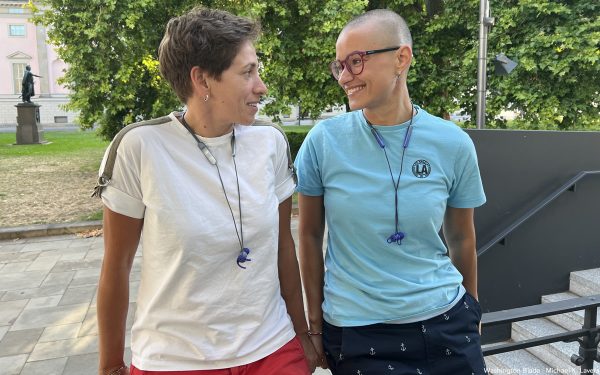
Shapoval, Baraniuk and Mulyukina are among those who attended a reception that took place at the end of a two-day meeting the Organization for Refuge, Asylum and Migration organized that took place in Berlin from July 21-22.
Activists from Ukraine, Germany, Poland, Romania, Moldova, Slovakia, the Czech Republic, the Netherlands, Italy and the U.S. attended the gathering that had a stated goal of starting “the conversation about long-term/mid-term needs and solutions for LGBTIQ Ukrainians and incite collaboration among stakeholders working with LGBTIQ Ukrainians and third-country nationals.”
“We were thrilled to bring together activists and human rights defenders from 10 countries and 20 organizations to develop medium and long-term strategies to support displaced LGBTIQ Ukrainians and third country nationals,” ORAM Executive Director Steve Roth told the Blade after the meeting. “All these organizations, including ORAM, have done an amazing job getting emergency support and services to LGBTIQ Ukrainians in need. As the war in Ukraine drags on, it’s more important than ever for organizations to coordinate efforts and plan for supporting longer term needs. This two-day roundtable in Berlin was a great step in that direction.”
ORAM has partnered with Airbnb.org and Alight (formerly known as the American Refugee Committee) to provide more than 1,000 nights of short-term housing to LGBTQ and intersex Ukrainians and other displaced people in Germany and other countries in Europe. Shapoval, Baraniuk and Mulyukina are among those who live in such apartments.
Roth noted ORAM has begun to develop “a housing collective” for LGBTQ and intersex Ukrainians in Berlin. He said ORAM rents the apartments in which the refugees can live for up to six months, “allowing them to register in Berlin, access social welfare and other services.”
“Safe and secure housing is one of the most urgent needs facing displaced LGBTIQ Ukrainians,” Roth told the Blade. “It’s an essential element in getting settled and rebuilding lives.”
Berlin Pride shows solidarity with Ukraine
The meeting ended a day before the annual Christopher Street Day parade took place in Berlin.
Baraniuk helped carry ORAM’s banner during the parade, while Mulyukina took pictures for the organization.
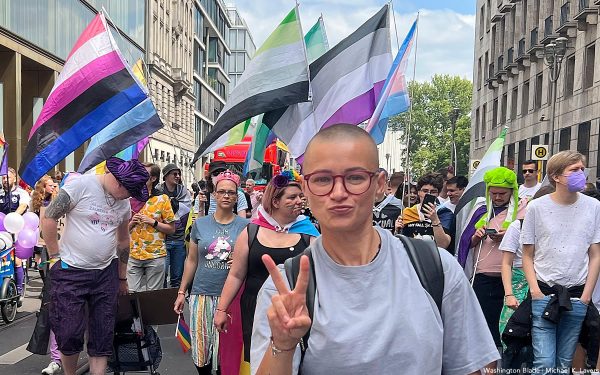
‘Stop Russian aggression’
Kyiv Pride Executive Director Lenny Emson is one of LGBTQ and intersex activists from Ukraine who participated in the ORAM meeting and in the parade.
He told the Blade before the parade began that he took several trains from Kyiv to Poland before he flew to Berlin. Emson said the trip took two days.
“I understand that it is a safe ground, but I still have those flashbacks,” Emson told the Blade as he smoked a cigarette in front of a hotel near the parade staging area. “When you were sitting in the conference room and I saw something that reminds me of an air raid siren I was getting a panic attack. It doesn’t matter if you’re in a safe place.”
Emson also took issue with parade organizers’ opposition to war.
“Unfortunately, we as the Ukrainian community here (are) very disappointed with the motto that Berlin Pride put on the main stage: No war,” said Emson. “This doesn’t reflect the feelings that we have right now.”
“We would like to actually say it loud: Stop Russian aggression,” he added. “We need action right now. We need to stop it. We need to stop Russian aggression. We need to stop it right now.”
A group of marchers held a blue and yellow — the colors of Ukraine’s flag — banner that read “Arm Ukraine: Make Pride in Mariupol possible” while others simply carried the Ukrainian flag.
A man carried a homemade sign that read “Arm Ukraine: Make Pride in Kyiv, Kharkiv, Odesa, Zaporizha, Kryvyi Rih possible again.” Viktoriya, a woman from northern Ukraine who is now pursuing her PhD in Berlin, held a cardboard poster that noted her homeland’s “queer soldiers are fighting for all of us.”
“I’m marching for both rights of queer people and rights of Ukrainians: The right to live and the right for love,” she said as she marched towards Potsdamer Platz in the center of Berlin.
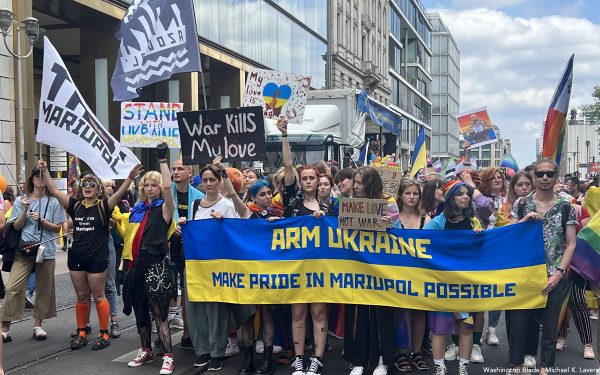
Discrimination and violence based on sexual orientation and gender identity was commonplace in Ukraine before the war.
Ukrainian President Volodymyr Zelenskyy last year pledged his country would continue to fight anti-LGBTQ and anti-intersex discrimination after he met with President Joe Biden at the White House.
Shapoval, who is dating a man he met last October when he traveled to Berlin, told the Blade that he received “looks” in Kyiv if he wore a pink shirt.
He was wearing a pair of purple sneakers during the interview. Shapoval said he would not have been comfortable wearing them if he were still in Kyiv.
“For me it was even harder because I had misery in Ukraine because of homophobes,” he said. “Even the gay community is so toxic in Ukraine because it’s all about toxic masculinity and all of that … I also had some experiences where gays were like, ‘Oh my gosh just cut your hair and then we will get in touch with you.'”
Shapoval has begun the process of applying for German residency.
“I fell in love with the city right from the beginning,” he said. “I found friends here.”
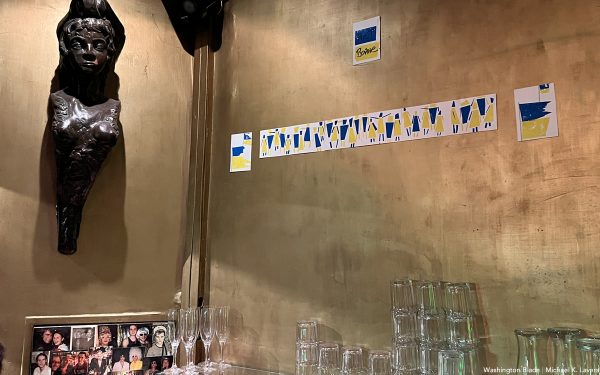
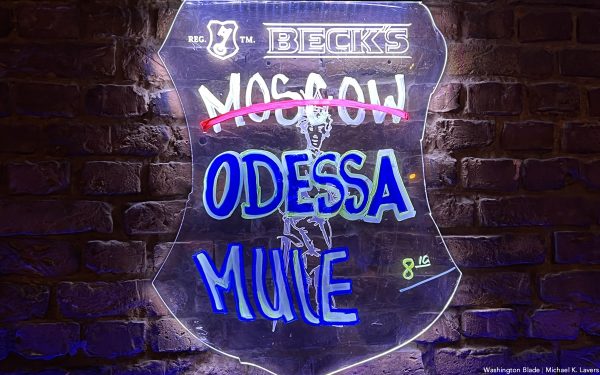
Jessica Stern, the special U.S. envoy for the promotion of LGBTQ and intersex rights, and others have noted transgender and gender non-conforming Ukrainians have not been able to leave the country because they cannot exempt themselves from military conscription. Another issue that LGBTQ and intersex Ukrainians have faced as they attempt to resettle in another country is the lack of legal recognition of their relationships.
A marriage equality petition that Kyiv Pride submitted to Zelenskky on July 12 received more than 28,000 signatures, which is higher than the threshold that requires him to consider it. Ukrainian law requires Zelenskky to respond to it within 10 days of receiving it.
Baraniuk and Mulyukina hope to resettle in the U.S. and Canada, but are unable to legally prove they are in a relationship. The U.S. has a marriage-based immigration system for bi-national couples, while the Canadian system requires them to be married or “common-law partners.”
The U.S. has approved Baraniuk’s resettlement request, but denied Mulyukina.
They said the process to legally prove they are together is prohibitively expensive.”Right now we are looking for a way to get the proof that we are a couple,” said Baraniuk. “We don’t want to stay in Berlin.”
Europe
Estonia’s marriage equality law takes effect
Statute is ‘a very important message from the government’
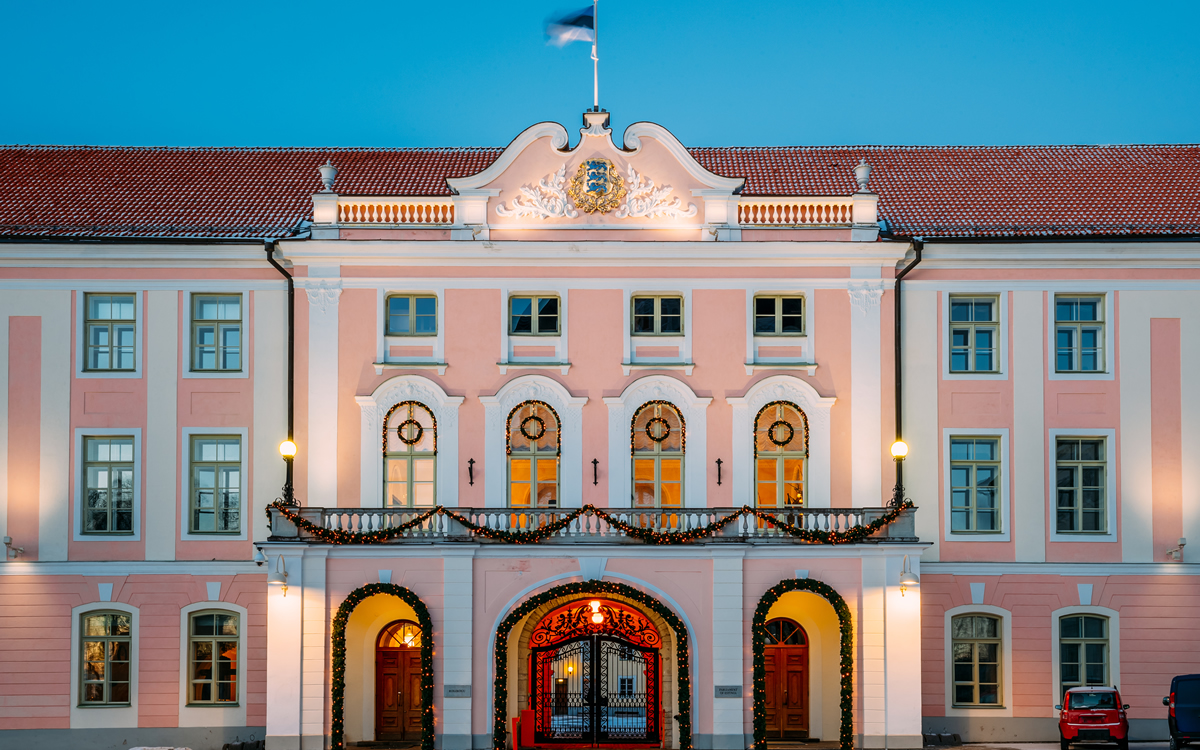
A law that extends marriage and adoption rights to same-sex couples in Estonia took effect on Monday.
Lawmakers last July approved the marriage equality bill by a 55-34 vote margin. Estonia is the first Baltic country and the first former Soviet republic to allow same-sex couples to legally marry.
“It’s an important moment that shows Estonia is a part of northern Europe,” Baltic Pride Project Manager Keio Soomelt told the Guardian newspaper. “For the LGBT+ community, it is a very important message from the government that says, finally, we are as equal as other couples; that we are valuable and entitled to the same services and have the same options.”
The country’s civil partnership law has been in place since 2013.
The Guardian reported same-sex couples could begin to apply for marriage licenses on Monday. Authorities are expected to process the first applications by Feb. 2.
Europe
Pope Francis says he is open to blessings for same-sex unions
Pontiff vehemently opposed marriage equality in native Argentina

Pope Francis has said he is open to the possibility that the Catholic Church would allow blessings for same-sex unions.
The Vatican’s Dicastery for the Doctrine of the Faith on Monday released a letter that Francis wrote to five cardinals who urged him to reaffirm church teaching on homosexuality ahead of this week’s Synod on Synodality, a meeting during which LGBTQ Catholics, women in the church and other issues will be discussed.
Francis wrote the letter on July 11.
The Associated Press reported Francis said “such (same-sex) blessings could be studied if they didn’t confuse the blessing with sacramental marriage.”
“This new step, outlined in a document released on Oct. 2 by the Vatican’s Dicastery for the Doctrine of the Faith, allows for pastoral ministers to administer such blessings on a case-by-case basis, advising that ‘pastoral prudence’ and ‘pastoral charity’ should guide any response to couples who request a blessing,” noted Francis DeBernardo, executive director of New Ways Ministry, a Maryland-based organization that ministers to LGBTQ Catholics, on Monday in a press release. “It also indicates that permitting such blessings cannot be institutionalized by diocesan regulations, perhaps a reference to some dioceses in Germany where blessings are already taking place with official and explicit permission. ‘The life of the church,’ the pope writes, ‘runs through many channels in addition to the standard ones,’ indicating that respecting diverse and particular situations must take precedence over church law.”
DeBernardo in the same press release said the “allowance for pastoral ministers to bless same-gender couples implies that the church does indeed recognize that holy love can exist between same-gender couples, and the love of these couples mirrors the love of God.”
“Those recognitions, while not completely what LGBTQ+ Catholics would want, are an enormous advance towards fuller and more comprehensive equality,” he said. “This statement is one big straw towards breaking the camel’s back of the marginalized treatment LGBTQ+ people experience in the church.”
The Vatican’s tone towards LGBTQ and intersex issues has softened since Francis assumed the papacy in 2013.
Francis has publicly endorsed civil unions for same-sex couples, and has said laws that criminalize homosexuality are “unjust.” Church teachings on homosexuality and gender identity have nevertheless not changed under Francis’ papacy.
Francis earlier this year told a newspaper in his native Argentina that gender ideology as “one of the most dangerous ideological colonizations” because “it blurs differences and the value of men and women.”
The pope was the archbishop of Buenos Aires when a law that extended marriage rights to same-sex couples in Argentina took effect in 2010. Francis was among those who vehemently opposed the marriage equality bill before then-President Cristina Fernández de Kirchner signed it.
Europe
Andorran prime minister comes out as gay
Xavier Espot Zamora spoke with country’s public broadcaster
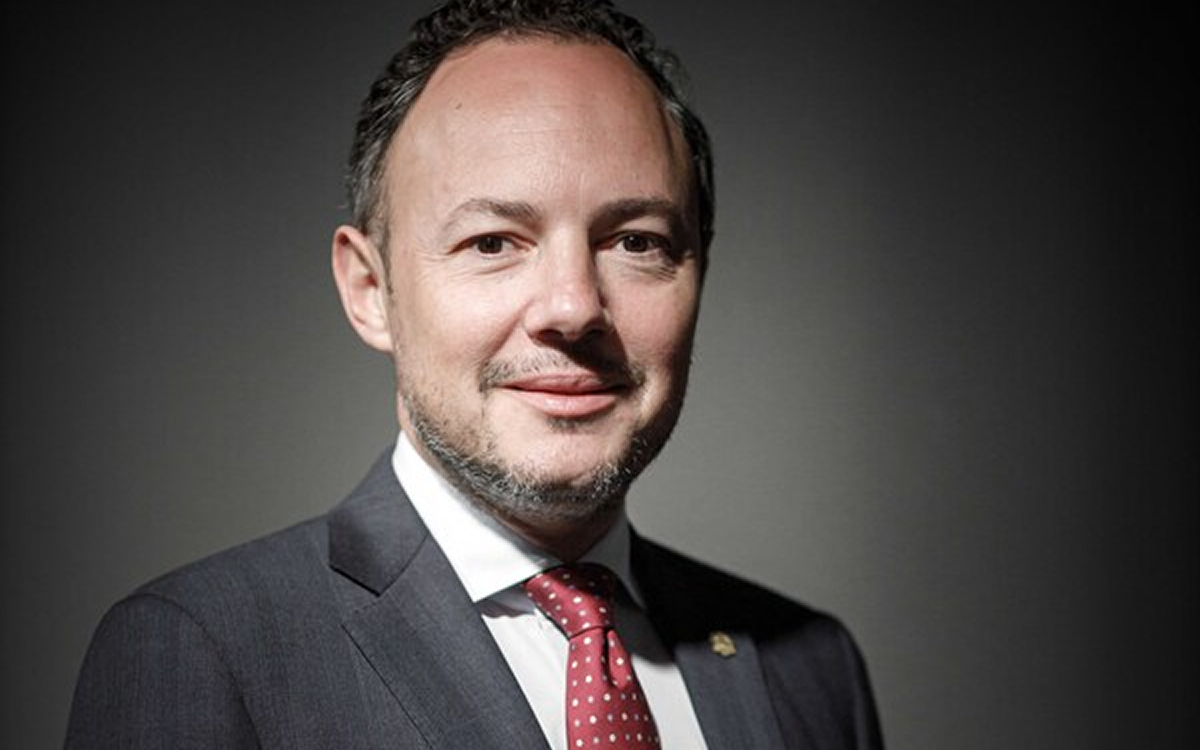
Andorran Prime Minister Xavier Espot Zamora has come out as gay.
“I’m gay. I’ve never hid it,” he said during an interview with Radio and Television of Andorra, the country’s public broadcaster, on Monday. “Now, if I’m not asked I don’t have to say it, in the sense that it doesn’t define the entirety of who I am and even less my personal politics, but at the same time I think it shouldn’t be a problem to express it. And if this helps many children, young people or teenagers who are going through a difficult time see that in the end, regardless of their condition or sexual orientation, you can prosper in this country and reach the highest magistracy, then I am happy to express it.”
Andorra is a small country known for its ski areas that is nestled between Spain and France in the Pyrenees.
Espot has been prime minister since 2019. The country’s lawmakers in 2022 extended marriage rights to same-sex couples.
The prime minister is one of a handful of heads of state and government who are openly gay or lesbian.
Latvian President Edgars Rinkēvičs took office in July.
Luxembourgish Prime Minister Xavier Bettel has been in office since 2013, while Ana Brnabić became Serbia’s prime minister in 2017. Irish Prime Minister Leo Varadkar is openly gay.
Deputy Belgian Prime Minister Petra De Sutter is a transgender woman.
Then-Icelandic Prime Minister Jóhanna Sigurðardóttir in 2009 became the world’s first openly LGBTQ head of government.
-

 LGBTQ Non-Profit Organizations5 days ago
LGBTQ Non-Profit Organizations5 days agoDay of [no] silence, a call to speak out against anti-LGBTQ+ hate
-

 Africa1 day ago
Africa1 day agoCongolese lawmaker introduces anti-homosexuality bill
-

 Colorado3 days ago
Colorado3 days agoFive transgender, nonbinary ICE detainees allege mistreatment at Colo. detention center
-
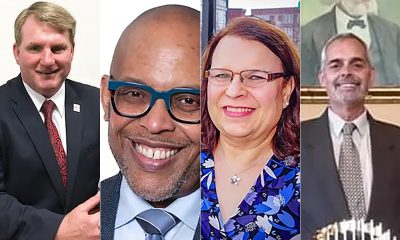
 District of Columbia5 days ago
District of Columbia5 days agoFour LGBTQ candidates running for delegate to Democratic National Convention from D.C.



